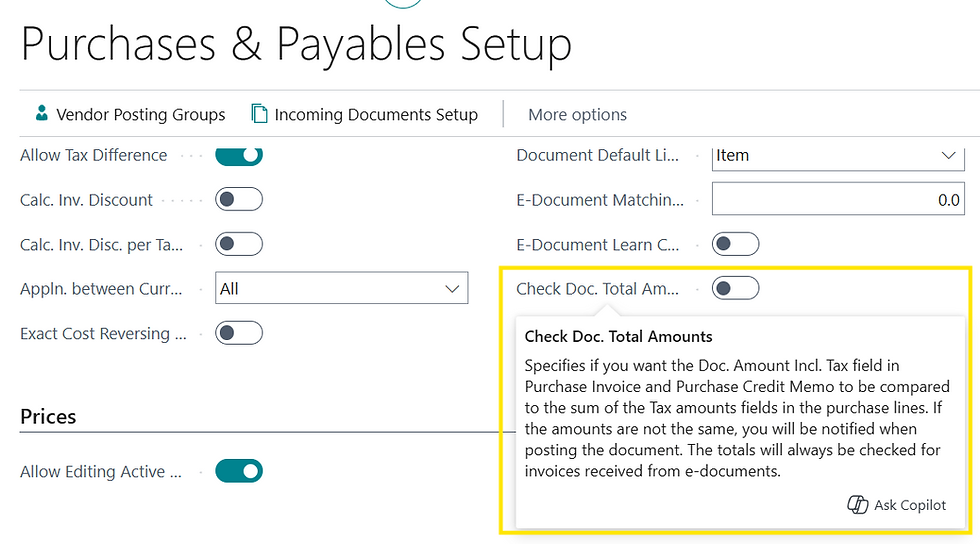Purpose of Assigned User ID field in Business Central
- akash shukla
- Aug 15, 2025
- 3 min read
In Business Central, the Assigned User ID field on a Purchase Order (and many other documents) is essentially a workload ownership / task responsibility field.
Purpose
Assigns responsibility for the document to a specific user in BC.
Acts as a filter for that user when viewing their pending or active documents.
Supports workflow by making it clear who’s supposed to process or follow up on the PO.
Where It’s Used
Found on Purchase Orders, Sales Orders, and similar transactional documents.
Can be manually set or automatically filled (e.g., via user setup or workflow).


Typical Uses
Workload Management Purchasing teams can split orders among team members. Example: Buyer A gets all orders for Vendor Group 1, Buyer B for Vendor Group 2.
Filtering in Role Centers The “My Purchase Orders” cue in the Role Center uses the Assigned User ID to show only the orders assigned to the logged-in user.
Workflow Approval Routing Some approval workflows can use the Assigned User ID to decide who should approve or process a document.
Task Tracking Makes it easy for supervisors to see who’s handling what, and reassign when needed.

Important Notes
It doesn’t control permissions — even if you’re not the assigned user, you can still open/edit the PO unless security permissions restrict it.
It’s not automatically the creator — the creator’s ID is stored in audit fields; the Assigned User ID is separate and can be changed at any time.
Can be updated via User Setup, Job Queue entries, or manually.
💡Example Scenario
If you have a purchasing team of 3 people, you can set each PO’s Assigned User ID to match the buyer who will follow it through — then each buyer’s Role Center dashboard will only show their purchase orders in the “My Purchase Orders” cue
Assigned User ID – Decision Table
Criteria | Yes → Likely Make Mandatory | No → Keep Optional | Why it Matters |
Approval workflows route based on assigned person? | ✅ Yes – Workflow needs it to know who to send for approval | ❌ No – Approvals are based on fixed roles or managers | Without it, workflow routing can fail or send to wrong person |
Dashboards (“My Purchase Orders”) used for workload tracking? | ✅ Yes – Role Centers depend on it for filtering | ❌ No – Users work from full PO list or custom views | Without it, dashboards will show incomplete or no data |
Multiple buyers handle separate vendor groups? | ✅ Yes – Each buyer is responsible for specific vendors | ❌ No – Single person or shared pool handles all orders | Without it, accountability may get mixed up |
Custom reports rely on Assigned User ID? | ✅ Yes – KPI or SLA reports use it for tracking performance | ❌ No – Reports are grouped by vendor/date/etc. | Without it, reports will miss owner-based analysis |
Management wants accountability for each PO? | ✅ Yes – Audit and follow-up require clear responsibility | ❌ No – Responsibility tracked outside BC | Without it, PO responsibility tracking may be manual |
System customisation enforces it? | ✅ Yes – Extension blocks posting without it | ❌ No – No validation linked to field | Without it, posting will work regardless |
✅Bottom line:
In standard BC, the Assigned User ID is just a helper field. You must use it only if your process design, workflow rules, or dashboards depend on it — otherwise it’s purely informational.
I hope you find this information helpful and useful for future reference.
Cheers….. 😊



Comments